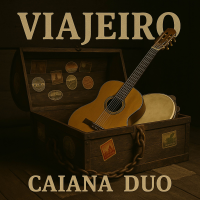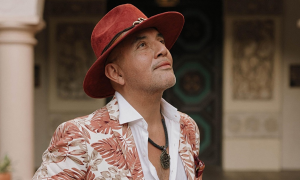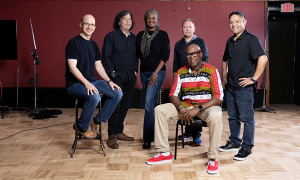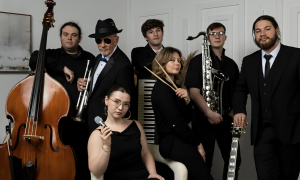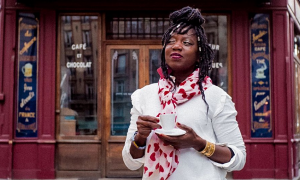Home » Jazz Articles » Take Five With... » Take Five With Tim Richards
Take Five With Tim Richards
 Tim's first encounter with a piano was at the age of eight, in a dentist's waiting room. After classical piano lessons he taught himself jazz and blues from the age of 14, after seeing
Tim's first encounter with a piano was at the age of eight, in a dentist's waiting room. After classical piano lessons he taught himself jazz and blues from the age of 14, after seeing 
Thelonious Monk
piano1917 - 1982
Since forming the long-lived modern jazz quartet Spirit Level in Bristol in 1979, he has performed his compositions at jazz clubs and festivals in almost every European country. Tim expanded Spirit Level to a nine-piece in 1999, renaming it Great Spirit and recording a first CD with an all-star lineup that included

Denys Baptiste
saxophoneb.1969

Gilad Atzmon
saxophone
Dick Pearce
b.1951
Tony Kofi
saxophone, tenorb.1966

Peter King
saxophone1940 - 2020
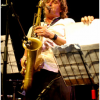
Ed Jones
saxophone, tenor
Jason Yarde
saxophone, alto
Sebastian Rochford
drumsTim has released over a dozen albums under his own name, featuring line-ups from duo to nine-piece, including two with Austrian saxophonist Sigi Finke and three trio albums including his most recent CD, Shapeshifting (33Jazz, 2010). Two of his trio CDs are listed in the Japanese publication, The 100 Best Piano Trio Records of All Time.
He also enjoys playing blues and has toured and recorded with many well-known blues artists, including the award-winning

Otis Grand
b.1950
Joe Louis Walker
guitar, electricb.1949
Apart from his playing activities, Tim is one of Britain's best-known jazz educators, a jazz examiner and contributor to the ABRSM jazz piano syllabus, and the author of four acclaimed tutors including Improvising Blues Piano (1997) and Exploring Jazz Piano (2005), published by Schott Music (with CDs). The latter won the prestigious MIA award for "Best Pop Publication" in 2006. Tim currently teaches jazz piano at Morley and Goldsmiths Colleges and The City Lit in London.
Instrument(s):
Piano.
Teachers and/or influences?
My pianistic influences are, in no particular order:

McCoy Tyner
piano1938 - 2020

Bill Evans
piano1929 - 1980

Wynton Kelly
piano1931 - 1971

Hampton Hawes
piano1928 - 1977

Thelonious Monk
piano1917 - 1982

Duke Ellington
piano1899 - 1974

Otis Spann
piano1930 - 1970

Herbie Hancock
pianob.1940

Professor Longhair
piano1918 - 1980

James Booker
piano1939 - 1983

Chick Corea
piano1941 - 2021

Abdullah Ibrahim
pianob.1934

Oscar Peterson
piano1925 - 2007
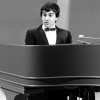
Dudley Moore
pianob.1935

Gene Harris
piano1933 - 2000

Dave Brubeck
piano1920 - 2012

Benny Green
pianob.1963
I knew I wanted to be a musician when...
I first sat at a grand piano, aged eight.
Your sound and approach to music:
As a self-taught jazz player, I draw on a variety of approaches, rather than following methods taught in the conservatoire. Groove is an important aspect of most of what I do. A strong blues influence often permeates my work—The Rough Guide to Jazz described my style as "Luminously funky... Iaced with the blues..."
Your teaching approach:
I well remember how it feels to be completely in the dark when trying to learn jazz —when I became interested as a teenager there were very few books available, and it wasn't possible to study jazz at college. I get a lot of satisfaction from helping people who may be in the same position as I was back then.
Concerning jazz improvisation, my philosophy is that there is no right or wrong way to do it. I always stress that any tune or chord sequence lends itself to a variety of approaches, and try to suggest some of these to my students.
I now have four tuition books on the market, published by Schott Music. For the beginning improviser I usually recommend Improvising Blues Piano as a good starting point, since the blues only uses three chords and a simple 12-bar sequence, and there is less theory and harmony to take onboard. Many of the basic concepts of jazz can be introduced in the context of playing blues —eg: walking bass lines, swing eighth notes, use of modes, rootless voicings, horizontal and vertical improvisation, etc.
The two books that follow, Exploring Jazz Piano, Vols 1 and 2, are a systematic and graded method, organized following harmonic principles. It is my opinion that most jazz books start with material that is too complex, often ignoring basic building blocks such as major and minor triads. Vol 1 spends a considerable amount of time with triads before moving on to seventh and ninth chords. The second volume extends the approach to cover more complex harmony such as sus4 and #11 chords, quartal, rootless and two-handed voicings, altered and diminished chord and scales, polychords, etc.
My most recent book Exploring Latin Piano is a collaboration with pianist
Johnny Crawford
vocalsb.1946
Your dream band:
I am lucky to have already formed my dream band, the nine-piece Great Spirit, composed of all my favorite British jazz musicians, all bandleaders in their own right. This in itself was often problematic, as everyone was always busy, just organizing a rehearsal was usually a nightmare, and everyone wanted long solos in every tune! Nevertheless we managed to tour the UK several times between 1999 and 2006, played some great gig and festivals, and recorded two highly acclaimed CDs on the 33 Records label.
Road story: Your best or worst experience:
I knew the writing was on the wall for Great Spirit when we broke down in our tour bus 40 miles outside Aberdeen in the North of Scotland, on our way to our last gig in Edinburgh in November 2006. After several hours of stressful waiting, the rescue truck eventually showed up, but it wasn't big enough for all nine people plus all our equipment (which included vibes, keyboards, double bass, drum kit, amps, etc).
Another long wait, and eventually somebody from a local garage took us to Edinburgh, where we just made it in time to play our gig, but were left without transport and no hotel, since the plan had been to drive home afterwards.
Having previously called the hire company, they sent another bus and driver up from London (300 miles away) to take us home, but he didn't arrive until about 2 am, some three hours after the end of our gig. Meanwhile we were forced to pack up our gear on the pavement outside the club and wait for him!
All the stress accompanying this scenario made me realize just how easily things can go pear-shaped. Touring is great when things go according to plan and you're working with the right bunch of people, but there have got to be easier ways of doing it than taking a nine-piece band on the road!
Favorite venue:
I've played many amazing venues, but in London my favorite is the Pizza Express Jazz Club in Dean Street, Soho. It has a nice grand piano and holds only 100 people, making it intimate enough to connect strongly with the audience.
Your favorite recording in your discography and why?
I have a soft spot for the two Great Spirit CDs, recorded with my nine-piece band, with whom I was touring at the time, and featuring the cream of London's jazz musicians. The 2005 Epistrophy CD ,in particular, received some great reviews.
Otherwise my favorite CD is of course the most recent one —Shapeshifting, recorded in 2010 with my trio.
The first Jazz album I bought was:
Either Miles Smiles (Miles Davis) or Monk's Dream (Thelonious Monk).
What do you think is the most important thing you are contributing musically?
I think one needs to have a certain amount of modesty when assessing one's position in the grand scheme of things! It's very gratifying when people enjoy one's music, but I expect that my tuition books will be read long after people have stopped listening to my CDs!
CDs you are listening to now:
Staff Benda Bilili, Tres Tres Fort.
Desert Island picks:

Pharoah Sanders
saxophone, tenor1940 - 2022

Freddie King
vocals1934 - 1976
Miles Davis, Bitches Brew (Columbia);

Ray Charles
piano and vocals1930 - 2004
How would you describe the state of jazz today?
Still evolving and fragmenting.
What are some of the essential requirements to keep jazz alive and growing?
Develop a younger audience. Reverse the trend for marginalization perpetuated by the media. Get it back on TV and mainstream radio.
What is in the near future?
I'm currently writing a lot of piano music and am becoming very interested in the possibilities offered by multiple pianos. The first step may well be a collection of duets for four hands on one piano.
I was also recently commissioned to write a piece for pianist Kate Ryder, featuring her collection of vintage toy pianos and a looper pedal. The resulting sound of the toy pianos layered on top of one another has an almost gamelan-like quality. It was first performed on May 21, 2011 at the Royal Festival Hall in London.
I'm now beginning to plan ahead for my 60th birthday gig at London's Kings Place in October 2012, of which more anon...
If I weren't a jazz musician, I would be a:
Perhaps a painter, photographer or film maker.
Photo Credit
Pete Lukas
Tags
Tim Richards
Take Five With...
United States
Thelonious Monk
Denys Baptiste
Gilad Atzmon
Dick Pearce
Tony Kofi
Pete King
Ed Jones
Jason Yarde
Seb Rochford
Otis Grand
Joe Louis Walker
McCoy Tyner
Bill Evans
Wynton Kelly
Hampton Hawes
duke ellington
Otis Spann
Herbie Hancock
Professor Longhair
James Booker
Chick Corea
abdullah ibrahim
oscar peterson
Dudley Moore
Gene Harris
Dave Brubeck
Benny Green
John Crawford
Pharoah Sanders
Freddie King
Ray Charles
Comments
PREVIOUS / NEXT
Support All About Jazz
 All About Jazz has been a pillar of jazz since 1995, championing it as an art form and, more importantly, supporting the musicians who make it. Our enduring commitment has made "AAJ" one of the most culturally important websites of its kind, read by hundreds of thousands of fans, musicians and industry figures every month.
All About Jazz has been a pillar of jazz since 1995, championing it as an art form and, more importantly, supporting the musicians who make it. Our enduring commitment has made "AAJ" one of the most culturally important websites of its kind, read by hundreds of thousands of fans, musicians and industry figures every month.



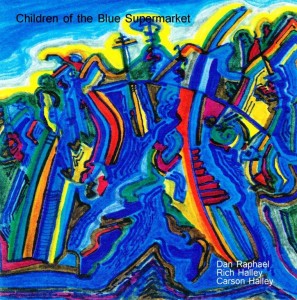
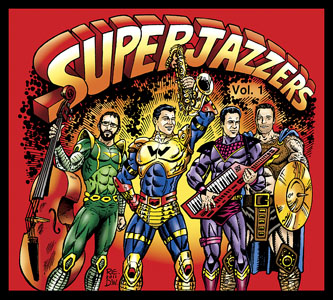

 Buy Now
Buy Now



